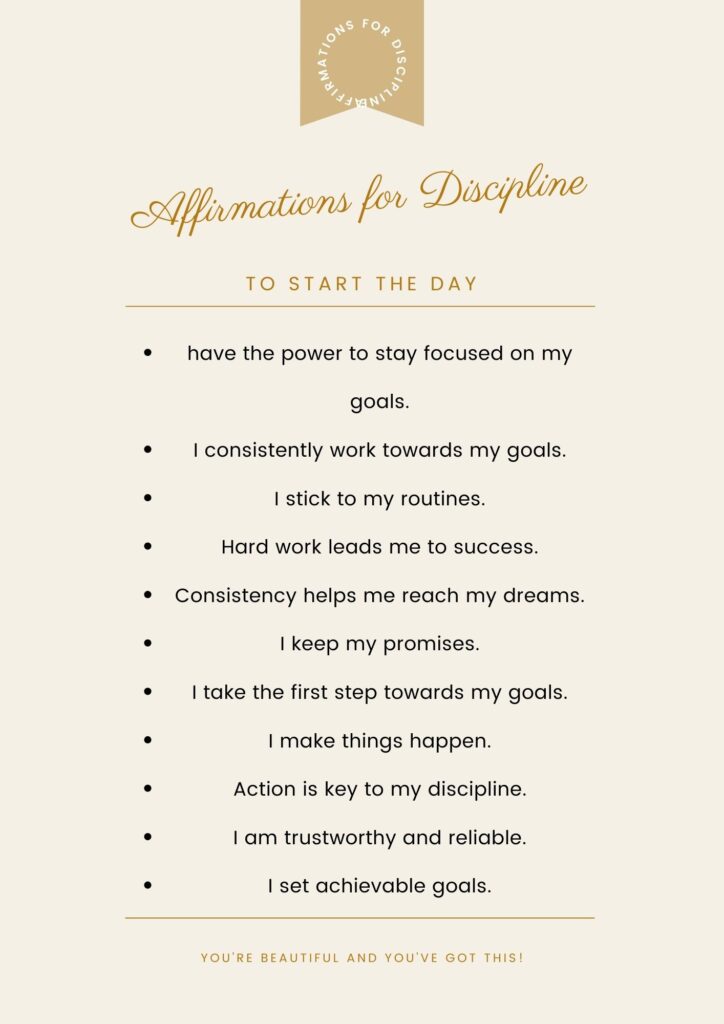Affirmations for discipline can play a significant role in achieving personal goals. Many people struggle with self-discipline, often finding it hard to stay focused or stick to a routine.
Using positive self control affirmations helps reinforce commitment and motivates to overcome distractions.

These self discipline affirmations act as powerful reminders of one’s capabilities and intentions.
By incorporating them into daily routines, individuals can cultivate a mindset that encourages consistent effort toward their objectives.
The practice of repeating affirmations can lead to improved self-control and a greater sense of responsibility.
As discipline is essential for success in various aspects of life, finding the right affirmations can pave the way for lasting change.
This article will explore effective affirmations that inspire discipline and offer practical tips to integrate them into everyday life.
Understanding Discipline
Discipline is a vital trait that helps individuals achieve their goals and maintain focus. It involves controlling impulses and staying committed to a task.
The following sections explore the psychology behind self-discipline and the key principles that support its development.

The Psychology of Self-Discipline
Self-discipline is linked to how the brain processes decision-making and impulse control. It is often connected to the prefrontal cortex, which helps manage planning and self-regulation.
When individuals practice self-discipline, they train their brains to prioritize long-term rewards over short-term pleasures.
A strong sense of self-awareness is essential. It allows individuals to recognize their triggers and temptations.
This awareness helps them make better choices aligned with their goals. Techniques like mindfulness can enhance this awareness and lead to improved self-discipline.
Key Principles Behind Strong Discipline
Several key principles help build strong discipline. First, setting clear and achievable goals is crucial.
Individuals should break larger goals into smaller, manageable tasks to avoid feeling overwhelmed.
Routine is another important aspect. Establishing a consistent daily schedule can help reinforce discipline. Check how to stick to a productive morning routine and monthly reset routine.
Prioritizing tasks and eliminating distractions also contribute to a disciplined mindset.
Support systems also play a role. Surrounding oneself with positive influences can encourage an individual to stay on track. Lastly, practicing self-compassion is vital.
Recognizing that setbacks are part of the journey allows for resilience and a renewed commitment to goals.
The Role of Affirmations in Developing Discipline
Affirmations play a vital role in shaping one’s mindset and building self-discipline.
By reinforcing positive thoughts, they encourage consistent actions toward personal goals.

Understanding how these affirmations influence behavior and their scientific backing can enhance anyone’s approach to discipline.
How Affirmations Influence Behavior
Affirmations can directly impact a person’s actions and decisions. When individuals repeat positive statements, they begin to internalize these beliefs.
This can lead to a change in their mindset.
For instance, someone who tells themselves, “I am committed to my goals,” may start prioritizing tasks more effectively.
Through regular practice, these affirmations can create a more disciplined attitude toward work, studies, or personal habits.
Additionally, affirmations serve as reminders during challenging times. When faced with temptation or distraction, recalling a positive affirmation can redirect focus.
This shift in thought can make it easier to follow through on commitments.
The Science of Positive Self-Talk
Research supports the effectiveness of positive self-talk in improving behavior and discipline.
Studies show that repeating positive affirmations can stimulate areas of the brain linked to motivation and self-regulation.

When individuals practice affirmations, they may experience a boost in confidence. This heightened self-assurance often results in increased persistence in facing challenges.
Affirmations create a feedback loop, reinforcing a sense of capability and encouraging ongoing discipline.
Moreover, using specific, actionable affirmations can lead to better outcomes. For example, saying, “I am disciplined in my study habits,” can reinforce a routine.
This focused approach helps in overcoming procrastination and building lasting discipline.
Crafting Effective Affirmations for Discipline
Creating effective affirmations requires attention to specific components and personalization.
By understanding these elements, individuals can craft affirmations that support their discipline and help them achieve their goals.
Components of Powerful Affirmations
Powerful affirmations have several key components.
They should be positive, focusing on what an individual wants to achieve rather than what they want to avoid.
For example, instead of saying, “I will stop procrastinating,” a better affirmation is, “I am consistent and focused on my tasks.”
Additionally, affirmations should be present tense. This helps the mind accept them as current realities.
Phrases like, “I am disciplined and dedicated,” reinforce a proactive mindset.
Another element is specificity. Clear and concise wording supports better visualization of goals.
For instance, “I complete my assignments on time every day” is more powerful than a vague statement.
Tailoring Affirmations to Personal Goals
Tailoring affirmations involves aligning them with personal values and aspirations. Each affirmation should reflect specific goals the individual wishes to achieve.
A person aiming for fitness might use, “I enjoy exercising regularly and prioritize my health.”
It is also essential to use language that resonates personally. Words that inspire and motivate provide a stronger impact.
For instance, someone might prefer saying, “I have the focus to achieve my life’s ambitions,” compared to a more generic affirmation.
Revising affirmations regularly is important too. As goals evolve, affirmations should adapt to reflect new aspirations.
Keeping them relevant ensures they remain a powerful tool for maintaining discipline.
Incorporating Affirmations into Daily Routine
Affirmations can be powerful when included in daily habits.
Practicing them consistently allows individuals to build discipline and reinforce positive behavior effectively.
Here are some specific strategies and tips to enhance your routine.
Strategies for Consistent Practice
To effectively integrate affirmations, individuals should choose specific times each day. Morning is often best, as starting the day positively sets a tone for what follows.
Next, he or she should create a list of affirmations that resonate personally. Then, they should write them down and keep the list visible.
Reading these affirmations aloud can enhance their impact.
Setting reminders on a phone or using sticky notes in common places can help maintain consistency.
Combining affirmations with daily activities, such as brushing teeth or commuting, will reinforce discipline seamlessly.
Creating a Conducive Environment for Discipline
A supportive environment plays a crucial role in the success of affirmations. It is helpful to designate a particular space for this practice.
This space should feel calm and inviting, free from distractions.
Adding visual aids, such as inspirational quotes or serene images, can enhance motivation.
Meanwhile, soft lighting or calming scents, like lavender, may also help set the mood.
Lastly, it is important for individuals to reflect on their progress regularly.
Keeping a journal to note thoughts and feelings about the affirmations can provide insights and motivation to continue this empowering practice.
Measuring Progress and Adjusting Affirmations
Tracking progress is essential for effective discipline.
It allows a person to see how well they are adhering to their goals and which affirmations are working. Adjusting these affirmations ensures they remain relevant and motivating.
Setting Benchmarks for Discipline
Establishing clear benchmarks helps a person measure their progress in discipline. These benchmarks can be short-term and long-term goals.
For example, a daily goal might be to practice discipline by working for two focused hours without distraction.
Long-term benchmarks could involve achieving a specific project milestone within a month. Writing down these benchmarks creates accountability.
It is also helpful to review these goals regularly to see if progress is being made.
Using a checklist can provide clarity. Here’s a simple example:
- Daily Goals
- Complete 30 minutes of focused work.
- Avoid social media distractions.
- Weekly Goals
- Finish two chapters of reading.
- Attend all scheduled events.
Regularly assessing these goals gives insight into improvements and areas needing change.
Refining Affirmations Over Time
As discipline improves, it is crucial to refine affirmations. Affirmations should reflect personal growth and new challenges.
Starting with simple affirmations can build a foundation, such as “I am focused on my tasks.”
As confidence builds, the affirmation can evolve to something more complex, like “I embrace challenges and learn from them.”
Updating affirmations keeps them relevant and empowering.
Listening to oneself is key. If an affirmation no longer resonates, it may lose its effectiveness.
Therefore, regularly reviewing affirmations ensures they align with current goals and mindset.
A practical approach is to keep a journal. In it, a person can note what affirmations inspire them each week. Tracking feelings about affirmations can enhance growth.
This dynamic approach keeps a person engaged and motivated.
100 Positive Affirmations for Discipline
Here’s the list of affirmations converted to “I”:
- I have the power to stay focused on my goals.
- Discipline comes naturally to me.
- I choose discipline over distraction.
- Every day, my self-control grows stronger.
- I am committed to personal growth.
- I have the strength to resist temptations.
- My willpower is unshakeable.
- I consistently work towards my goals.
- I stick to my routines.
- Hard work leads me to success.
- Consistency helps me reach my dreams.
- I keep my promises.
- My efforts matter.
- I take the first step towards my goals.
- I make things happen.
- Action is key to my discipline.
- I am trustworthy and reliable.
- Distractions do not control me.
- I set achievable goals.
- I embrace challenges with confidence.
- I learn from setbacks.
- My determination is strong.
- I have a plan for success.
- Focus is my ally.
- I overcome obstacles with ease.
- I value my time.
- Success is my choice.
- I prioritize my commitments.
- I create positive habits.
- I celebrate my progress.
- I visualize my success.
- I respond to challenges positively.
- I practice self-care to maintain focus.
- I surround myself with positivity.
- I stay motivated in tough times.
- I respect my boundaries.
- I take regular breaks to recharge.
- I learn continuously to improve.
- I stay consistent in my efforts.
- I build resilience over time.
- I manage my time wisely.
- I focus on the present moment.
- I act with purpose each day.
- I affirm my abilities.
- I take pride in my work.
- I keep learning new skills.
- I am open to feedback.
- I reflect on my experiences.
- I practice patience with myself.
- I acknowledge my achievements.
- I embrace routines that serve me.
- I set intentions every morning.
- I foster a growth mindset.
- I am in control of my choices.
- I visualize my goals clearly.
- I push through discomfort for growth.
- I encourage myself daily.
- I remain calm under pressure.
- I am proactive in my pursuits.
- I trust my instincts.
- I stay dedicated to my mission.
- I hold myself accountable.
- I resist negative thoughts.
- I cultivate a disciplined mindset.
- I recognize my triggers.
- I have the ability to adapt.
- I find solutions to problems.
- I value perseverance.
- I keep moving forward.
- I create a positive environment.
- I practice daily affirmations.
- I visualize my ideal future.
- I focus on results, not excuses.
- I maintain my passion for my goals.
- I choose growth over comfort.
- I think positively about my abilities.
- I trust the process of my journey.
- I take ownership of my decisions.
- I express gratitude for my progress.
- I engage in positive self-talk.
- I remain consistent in my efforts.
- I embrace a balanced lifestyle.
- I prioritize self-discipline in my actions.
- I set healthy boundaries with others.
- I learn from every experience.
- I am committed to lifelong learning.
- I visualize challenges as opportunities.
- I practice kindness towards myself.
- I lean on my support system.
- I celebrate small victories.
- I reflect on my goals regularly.
- I create a vision board for inspiration.
- I take initiative in my tasks.
- I recognize the value of hard work.
- I focus on what I can control.
- I accept my imperfections.
- I trust in my journey.
- I seek progress, not perfection.
- I maintain a positive attitude.
- I am always moving towards my best self.






